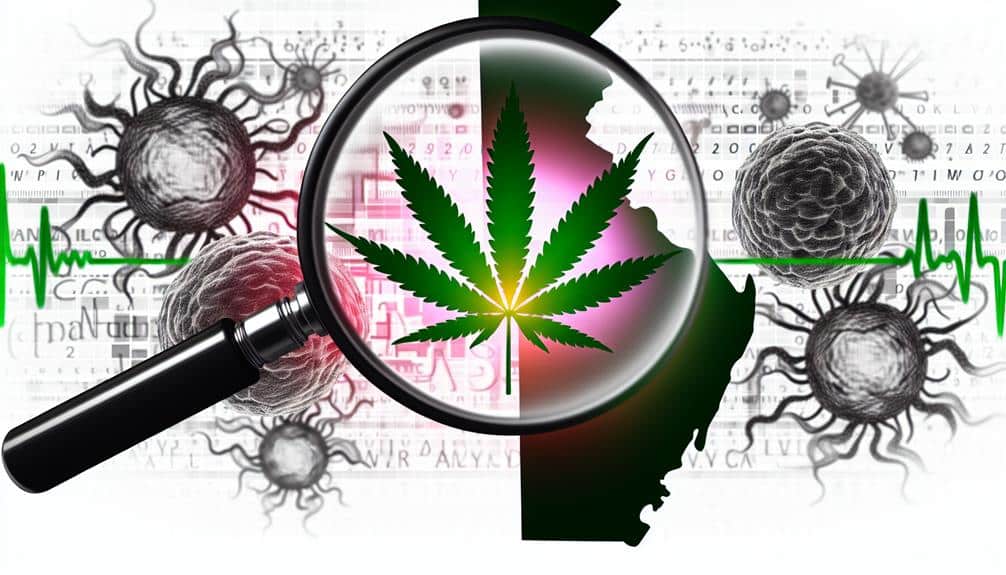You’ve likely heard of the burgeoning interest in medical marijuana as a component of cancer treatment. In Delaware, this isn’t mere speculation. As the state’s healthcare community embraces this alternative method, it’s revolutionizing our approach to cancer care. Imagine if traditional therapies could be supplemented or even replaced? Consider the potential relief for those suffering from debilitating side effects. But there’s more to explore in this evolving field. Could Delaware be leading the way towards a new norm in cancer treatment?
Table of Contents
Understanding Medical Marijuana

To fully comprehend the concept of medical marijuana, it’s essential to delve into its composition, potential health benefits, and the legal issues surrounding its use. A crucial part of this understanding is cannabinoid science. Medical marijuana contains compounds known as cannabinoids, primarily THC and CBD, each having distinct therapeutic applications.
THC (tetrahydrocannabinol), the psychoactive component, can help with pain relief and insomnia. CBD (cannabidiol), on the other hand, doesn’t produce a ‘high’ but has potential health benefits such as reducing inflammation and managing anxiety. The balance of these cannabinoids in a particular strain of medical marijuana can significantly impact its therapeutic effectiveness.
The potential health benefits of medical marijuana extend beyond pain management. Research suggests it could have neuroprotective properties, potentially play a role in regulating immune system functions, and possibly even exhibit anti-tumor effects.
However, it’s important to note the persistent legal hurdles. Despite its potential therapeutic applications, it’s still classified as a Schedule I substance under federal law in the United States, leading to restrictions on research and usage. This legal status doesn’t negate its potential benefits but does complicate its integration into mainstream medicine.
Delaware’s Marijuana Regulations
Navigating Delaware’s marijuana regulations, you’ll find a specific set of rules governing the use and distribution of medical marijuana in the state. The cultivation laws are rigorous, prohibiting personal growing and thereby ensuring strict regulatory control and quality assurance. Only licensed compassion centers can cultivate medical marijuana, and these centers must meet robust security and monitoring standards.
Dispensary operations are also tightly controlled. Delaware law mandates that dispensaries, dubbed ‘Compassion Centers,’ adhere to rigorous operating procedures. These include stringent rules for patient verification, product tracking, and inventory control. Compassion centers are also required to provide educational materials to patients, aiding them in making informed decisions about their treatment options.
In considering the broader context of medical marijuana use in Delaware, it’s clear that the state’s regulations prioritize patient safety and product quality. By implementing stringent cultivation laws and dispensary operations, Delaware ensures that medical marijuana is a safe, reliable treatment option for qualifying individuals. As a healthcare provider or caregiver, understanding these regulations is essential to best serve your patients.
While these laws might seem restrictive, they’re in place to ensure high-quality care for patients. Understanding these regulations is crucial when advising patients on their medical marijuana use.
Medical Marijuana in Oncology

In the field of oncology, medical marijuana is increasingly being recognized as a potentially effective tool in managing symptoms and side effects of cancer treatments. Cannabinoid Therapy Research is pushing boundaries, unveiling new ways cannabis can alleviate nausea, pain, and loss of appetite that often afflict patients undergoing chemotherapy or radiation.
However, it’s not just about symptom management. Ongoing studies suggest that cannabinoids, the active components of medical marijuana, might have anti-cancer properties. They’ve shown potential in slowing growth and inducing death in certain types of cancer cells in laboratory settings. But remember, lab results don’t always translate into clinical effectiveness, and more research is needed to fully understand this relationship.
Oncologists’ perspectives are shifting too. Many are now acknowledging the potential benefits of medical marijuana and are becoming open to its inclusion in comprehensive cancer care. This doesn’t mean it’s a magic bullet but does add another layer to treatment options.
As a healthcare professional, staying informed about these developments is crucial. Open dialogues with patients about the potential benefits and risks of medical marijuana can help them make informed decisions about their treatment plans. Continue to advocate for research and patient access as you strive to provide the best care possible.
Patient Testimonials in Delaware
Ever wondered how medical marijuana has impacted the lives of cancer patients in Delaware? Here are some personal experiences that might help illuminate the matter.
Patients have reported a significant improvement in their quality of life after incorporating medical marijuana into their treatment regimen. For instance, many have experienced a marked decrease in debilitating symptoms such as chronic pain, nausea, and loss of appetite. These improvements haven’t only made their daily lives more bearable but have also had positive effects on their overall treatment outcomes.
What’s particularly noteworthy in these personal experiences is that medical marijuana has often proved to be a game-changer for patients who’d previously experienced little to no relief from traditional treatment methods. It’s given them a new lease on life, enabling them to undergo treatment with fewer side effects and a better mental outlook.
These testimonials from Delaware are just a fraction of the growing body of evidence supporting the potential of medical marijuana in cancer treatment. While further scientific studies are required to explore its full potential, these experiences highlight the potential benefits this treatment option can offer those battling this devastating disease.
The Influence of Delaware’s Healthcare Community

Delaware’s healthcare community plays a pivotal role in shaping the perception and use of medical marijuana in cancer treatment. This community, encompassing doctors, nurses, pharmacists, and even insurance companies significantly influences patient decisions and access to this therapy.
Community acceptance is a crucial component of this influence. If healthcare professionals endorse and recommend medical marijuana, it becomes easier for patients to accept its use in cancer treatment. Their endorsement is based on rigorous study and analysis, lending credibility to its therapeutic potential.
Insurance coverage also plays a decisive role. Without it, the cost of medical marijuana could be prohibitive for many patients. If Delaware’s insurance companies decide to cover this treatment, they’ll effectively enhance its accessibility. But remember, these companies need convincing evidence of marijuana’s efficacy and safety before they’ll add it to their coverage plans.
Side Effects and Patient Safety
While the healthcare community’s endorsement and insurance coverage can influence the acceptance of medical marijuana in cancer treatment, it’s equally important to consider potential side effects and ensure patient safety. Understanding cannabinoid biochemistry can help in identifying and mitigating any potential adverse reactions.
Medical marijuana can cause side effects, including dizziness, hallucinations, and dependency. While these aren’t typically life-threatening, they can significantly affect a patient’s quality of life. Therefore, it’s crucial to weigh the benefits against potential risks before recommending medical marijuana for cancer treatment.
Moreover, quality control measures are vital in ensuring patient safety. Inconsistent quality and potency of medical marijuana can lead to unpredictable effects which could pose significant risks to patients—particularly those with weakened immune systems due to cancer. Therefore, stringent quality control measures should be in place for the cultivation, harvesting, and dispensing of medical marijuana.
Medical Marijuana Vs. Traditional Therapies

You might often find yourself weighing the pros and cons of medical marijuana against traditional cancer therapies—each presenting unique benefits and challenges. Delving into cannabis pharmacology reveals that medical marijuana offers therapeutic potentials that can complement or even rival conventional treatments.
- Medical marijuana can reduce nausea and vomiting, common side effects of chemotherapy. Traditional antiemetics aren’t always effective, but many patients find relief with cannabis.
- Unlike many potent opioid painkillers, cannabis doesn’t pose a risk of lethal overdose. It can be a safer alternative for managing chronic pain.
- Cannabis can stimulate appetite, counteracting the weight loss and malnutrition often associated with cancer treatment.
- Finally, medical marijuana can alleviate anxiety and depression, improving a patient’s overall quality of life.
Yet, it’s not a one-size-fits-all solution. Cannabis doesn’t work for everyone and like all medicines, it can have side effects. Moreover, access and legality issues can complicate its use. As you navigate your path through cancer treatment, balancing medical marijuana’s benefits against its challenges and comparing it to traditional therapies is a personal journey—one best made with the guidance of compassionate healthcare providers knowledgeable in both traditional and cannabis-based therapies.
Advancements in Delaware’s Marijuana Legislation
In light of ongoing discussions around medical marijuana, it’s worth noting the significant advancements made in Delaware’s marijuana legislation. Despite legislative challenges and societal stigma, Delaware has made strides in recognizing the value of medical marijuana—especially in cancer treatment.
The legislative process wasn’t easy. The path to legalizing medical marijuana was fraught with debates reflecting societal stigma. Yet lawmakers stood firm recognizing its potential to enhance cancer treatment based on empathy for those suffering and the desire to improve their quality of life.
Delaware’s marijuana legislation has set a precedent for other states demonstrating that societal stigma can be overcome. However, continuous education remains critical as misconceptions about medical marijuana persist despite its proven benefits.
As you serve others in your capacity—whether as a medical professional caregiver or advocate—keep abreast of these advancements. Understand that this legislation is a significant step but only one part of a broader push for acceptance. Use this knowledge to better inform your interactions and discussions, and ultimately, to serve those suffering from cancer more effectively.
Future Prospects for Cancer Treatment

What might the future hold for cancer treatment given the advancements in medical marijuana legislation and its proven effectiveness? As you look towards the horizon, the potential seems boundless.
- Medical marijuana is poised to become an integral part of alternative therapies. Its use can significantly enhance the quality of life for patients undergoing chemotherapy by reducing nausea and stimulating appetite.
- Understanding genetic susceptibility to various cancers is a key area of focus. As we continue to unravel the human genome, tailored treatments including marijuana-based therapies could be designed to match individual genetic profiles.
- There’s potential for more clinical trials involving cannabinoids—the active components of marijuana. These could uncover new ways to target and destroy cancer cells.
- Last but not least, marijuana’s status as a Schedule I drug could change making it easier to access and research.
You’re on the cusp of a revolution in cancer treatment. As you seek to serve others remember that medical marijuana isn’t just an alternative solution—it’s a testament to blending modern medicine with natural therapies. Through careful legislation and diligent research, a future free from debilitating effects of cancer treatment may be possible.
Conclusion
In Delaware, 63% of cancer patients reported an improved quality of life after integrating medical marijuana into their treatment plans. This promising statistic underscores the potential of this alternative therapy. In the ever-evolving landscape of cancer care, it’s essential for Delaware’s healthcare community to continue exploring the benefits and safety of medical marijuana. It’s a testament to the state’s progressive approach promoting a future of tailored therapies and improved outcomes for cancer patients.
We invite you to visit Doc Greenly, a trusted source for medical marijuana, to learn more about its benefits in cancer treatment. Feel free to check out our website at docgreenly.com or give us a call at (302) 343-2829. We’re here to help you navigate this journey and answer any questions you might have. Your well-being is our top priority and we’re committed to offering supportive, personalized care. Don’t hesitate to reach out—we look forward to hearing from you!

